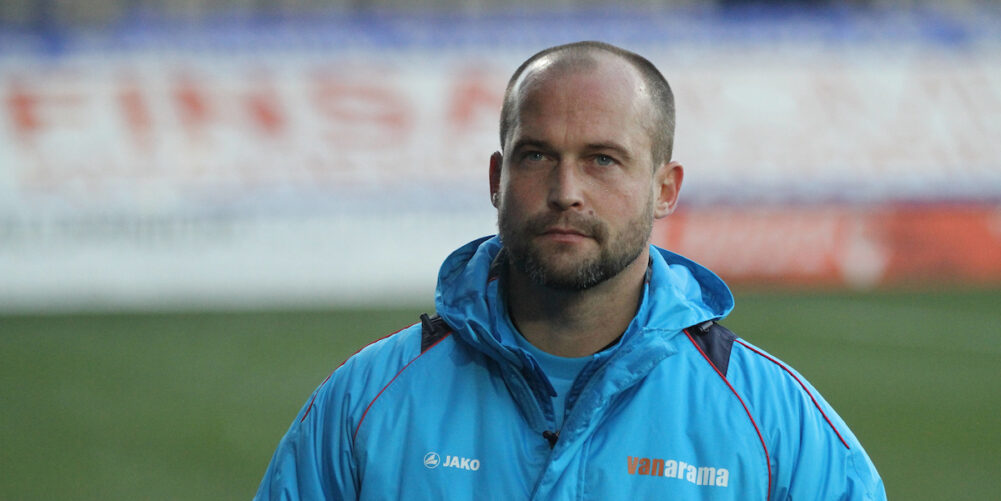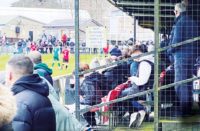It is nice to be in demand. If not for a raft of jobs, at least to have my phone ringing. The question I keep getting? “How do you survive in the National League?”
The other week I had lunch with a former colleague who is now involved in trying to keep up a team in the National League. He simply asked if he could talk to me about my experiences, what I thought mattered. I found myself making some notes for the meeting, and thought it would be a good article supporters and others in that position may find interesting.
So here are my own personal Dos and Don'ts of National League Survival:
DO: Look into the mirror; DON'T look out the window –
It still amazes me how new managers come into teams and think that threatening players with losing their jobs. ‘If you don't do it I will get someone else who can'. Is that going to suddenly improve performance and results? Motivation through fear is known to be very short lived, and actually more harmful than good in the long run, as it erodes any relationship and creates huge barriers to trust; both keys to sustained performance.
Teams that are underperforming will have one thing in common – high levels of anxiety and self doubt. That might be manifesting itself in all sorts of behaviours that others would describe as, ‘He is lazy' or ‘He is a bad team mate'. You have to see through that, and realise that FEAR and ANXIETY are the issues, and hence fixing those changes behaviour pretty quickly. ‘There are no bad students, only bad teachers,' as my mentor tells me all the time.
I take the view, ‘It is all my fault'. If you are a manager, then surely everything that goes on is under your control, and hence win or lose, it is your job, you who is responsible. Sure, some things, like interference from the board room or competing agendas from decision makers are totally out of your hands and they do effect how you are able to do your job. But as the leader, if you start making excuses for that, you are really giving the players an excuse, or a way out, where they can explain away any of their own failings. No matter what goes on, you ride it and you make the best of it.
That behaviour then transfers to the players (leadership by example); they learn from what they see from you, and before long, they all learn to take more responsibility, be more open to feedback to help them improve. Plus, it starts to build trust, it lets them know “you have their back” and that decreases anxiety, doubt, which is really the main barrier to them playing closer to their “ceiling” than their “floor”.
DO: Invest into effective relationships with your players; DON'T: Treat people like children.
As a player I hated it, the “naughty school boy” team talks and the “telling offs”. Plus the restrictive style of coaching, almost like they have a joystick and want to direct your every move, never allow you to learn, grow and become independent as a player.
New research talks about sports being played in a constant state of chaos, “Chaosplexity” it is termed. And hence the best preparation is to get your players ready to think for themselves in whatever situation occurs.
So as a coach, I focussed on building the most effective relationship I could with every player I worked with. You can't fake that; you can't do it because it benefits you. You have to be doing it because at your core, you believe in helping people grow – develop the player, develop the person, maximise potential was our mission statement with every player we worked with.
I look at where Angus MacDonald is now. Captaining Barnsley in the Championship and with Premier league clubs queuing up to take a look. I am so proud of him. The first day we took over at Torquay, we made him captain. People thought we were mad. Supporters at that time wanted him out of the team, let alone be our captain. But we knew if we helped him, and if we created the right environment around him, gave him some time, he could perform at his ceiling and be a great leader of men. It wasn't about where he was now, it was about where my coaching could get him and the effect that would have on the team and winning games.
Ultimately, the players on the pitch must make decisions in a split second, based on multiple incoming information that they process in the blink of an eye. As managers we should look to prepare them to make better and faster decisions in the heat of a game. That teaching process to me starts with having an effective relationship with your players, based on trust and shared vision.
Managers make assumptions about players far too quickly. They write them off without every really understanding them. They are human beings, not robots. If they are under performing, why not ask “why” before making a decision without having the full information.
Just this off season, my daughter had to give up her bed to allow a former player of mine somewhere to stay whilst he was here for off season work with Simon Jeffery – a strength & conditioning coach we used – and some other former players. I had set him up to stay at the clubs lodge facility, but at the last moment the club GM sadly decided he wouldn't allow it. So with it too late to find anywhere, I had four days of him sleeping in my daughter's bedroom whilst she shared with us. It was great fun, and it reminded me just how much I get from working with these players. It is more than about points, it really becomes like family when you get it right.
I would like to think Gus (Angus MacDonald), (Nathan) Smithy, Butts (Dan Butler), Bliss (Nathan Blissett, Brendan (Moore), GG (Giancarlo Gallifuoco), Kieffer (Moore), Dan Lavercombe, would all say the same. We helped them grow on and off field. We got the great satisfaction of seeing them do well, become people we were very proud of, and players who perform to their ceiling.
The only regret is that the club wouldn't allow me to extend some of their contracts, so we did not generate the income we could have and a huge opportunity to help the club financially was lost.
DO: Play to your strengths based on the players you have. DON'T: Say ‘This is how we play'.
If you have unlimited resources, you can turn up at a club, pay up 15-20 players you don't like, and bring in better players who probably don't need much leadership, they are just better than everybody else.
But that scenario never exists. Most likely, if you take over a club at this time of year, the chairmen is saying, ‘You need to clear up funds before you spend them'. That places a priority on getting the best out of what you have.
We performed SWOT reports on the players we had when we took over. What things could they do well, what could be our advantage? In year one, for example, we had a very young, inexperienced team. But we knew they had some athletic potential. We knew if we could just get some proper preparation into them, not mindless running, that we could have a physical advantage over other teams.
That was our plan. ‘Drag teams deep and drown them' became the mantra. We won so many games late; we kept so many clean sheets, through team defence, with Bliss and Shaun (Harrad) defending from the front, Gus and Smithy solid as rocks. We knew if the game went deep, we would win, and we did.
I have met managers who say, ‘This is how we play; I will not abandon my philosophy'. I personally find that total madness. Trying to have a team play like Barcelona is fine, if you have players who can do that. Otherwise, you are just setting them up to fail.
Analyse their strengths and weaknesses, involve the players in that process, and play to your strengths.
DO: Get the right people on the bus. DON'T: Be hypnotized by talent.
If you are fighting relegation, the common approach is to look for players who have played at a higher level, have some great talent, and add them to your team in the hope that talent will be enough. In my experience, it is exactly the opposite. When you are in a war, what you want are soldiers who will do their job. Substance and reliability, not flicks and tricks.
In year one, we finally cleared out about 11 contracts and had a tiny sum of money to find one or two players. Torquay obviously has geographical limitations, as well as at the time huge financial ones, so you are always limited. But I knew who I wanted. Bliss (Nathan Blissett) had just been released by Bristol Rovers, after firing them to promotion the year before. I knew him as a man, I knew he was a great person, and I knew that how he was performing wasn't anywhere near what he was capable of.
We worked so hard to get him here, it was Simon (Jeffery) who really convinced him to come and try again with us. He got inside Bliss' head and turned a few screws, got thing working properly again. He was great at that with all our players. Simon was very much our unsung hero, our secret weapon in that amazing survival season.
Bliss was, as I thought, lacking confidence, lacking a purpose. All he needed was someone to believe in him and help him regain his love for the game. Simon told me, ‘If he scores in his first few games, we are safe'. From the moment he scored a bullet header at Boreham Wood, I knew we had done it. We were still ten points adrift, but the team, the togetherness, and now with the final missing link, reborn Bliss, was unstoppable.
I signed Bliss because I backed him as a person and a team-mate. He has great talent for sure, he is unplayable at times, but I backed his substance as a person. I would go to war with him any day.
Players either buy in, or they need to be shipped out. Forget talent, find substance and back it no matter what.
DO: Get everyone from the tea lady to Chairmen on the same page. DON'T: Allow division, it creates tension and affects players well being.
This is one I do really know about! I managed Torquay for two years, but I probably had 20 years worth of off-field issues to deal with. In year one although the club had no owners, no money, nowhere to train, no travel or accommodation budget, players sleeping on floors, me having to buy boots for players on the morning of a game, we were all in it together. The amazing Dave Phillips and Steve Breed literally were taking pennies out of their own pockets, hiding the bills under the door mat and doing whatever it took to save the club.
To survive, you have to have an environment where players feel a purpose, a reason to do so. You have to have them feel like it matters, that the people they are working for are worth fighting for. Look at Newport last year, what a wonderful job they did in staying up. I was watching is closely as one of my former players, Dan Butler, a superb full back, was right at the heart of it. They survived from nowhere and you could see what it meant to them. No division.
When you have dis-trust from players to ownership, when the GM is hated by the players, if the manager and players are at odds, you have no chance.
You must all be clear about what the mission is and you must all set aside personal agendas for the common goal. No division.
DO: Ignore the Noise. DON'T: Listen to it.
Noise can ruin a team. Noise can be internal or external, in that it can be how players are talking and thinking to themselves. Or it can be what is coming from outside. It can literally cripple a player.
I was in a position where I had 12 fit players very often, and couldn't even afford local lads as we couldn't pay them to take a day off work. But I couldn't tell people that. Supporters would be hammering me saying, ‘Sign an experienced forward', or, ‘Sign a winger'. I would think, ‘I would love to but we can't afford his petrol let alone his wages!'
In my second year, with the club on the brink of administration and new owners and general manager on the way, the “noise” around the players was at an all time high. Looking back at that time, I wish I could have done a better job of quieting the noise, but it hurt the team, hurt our performances. Players want security, and they want to know there is a reason to work, a cause to fight for. When you have players' agents calling them telling them they need to move on because the manager is about to get sacked and the new manager won't want them, it can be very difficult to centre and focus a group.
In my team, that increased anxiety and self doubt manifested itself in huge tension, which really inhibited our play for really the whole year. That “noise” was almost too much to overcome, although thankfully we made it – just.
Players can wind themselves up into a right state at times, simply over thinking things, taking their eye off what is important; their preparation. They have so much time to think, you have to teach them to “ignore the noise” and “do what's important”. Similarly, you have to limit it, the noise, by again making sure everyone at the club sings from the same hymn sheet.
DO: Focus on “Next Practice”. DON'T: Start thinking too far ahead.
It is a mantra for me and was for my teams: Next Practice. What that means is, think only about the very single next thing and how you can do it at your very best. Nothing else. In that way, we could shut out distractions, we could stay tunnel vision, and not waste anxiety, energy on things outside of our control.
If you are not doing it right now, if it is not the very next thing you can affect, forget it. Next Practice.
DO: Understand how anxiety affects creativity. DON'T: Ask players to do things they cannot do consistently.
When teams are losing, players are unhappy, they start to get anxious, they lose belief. In that state, creativity and expression are the first qualities to go. So asking teams to play total football when they are scared of their own shadow, is never going to work. You have to rebuild confidence first, and then the rest follows. That can even happen in a single game. A team previously totally out of sync, gets 2-0 up, the home crowd are behind them, and all of a sudden, you see this great expansive football.
But the “fix” was to have a plan, a way to win, that they could execute in their current state (anxiety filled). Give them simple things, be pragmatic, and once they see a few good results, the rest will follow.
All too often you will hear the comment, ‘He is short on confidence'. That just means the question you should ask is, ‘How do I rebuild his confidence?' And that will lead you back to an effective relationship, a process, preparation and asking them to do things they are capable of.
Summary –
A relegation battle is something that can eat you up, or be the best learning experience of your life. I went through two, both in extreme but very different circumstances. I think what it taught me most of all was how sticking to some core philosophies you really can overcome anything, from your own employers wanting very different things to you, to having kids playing for free to sit on your bench, to driving a minibus to Macclesfield, to having no grass seed for your pitch or toilet roll for your changing rooms!



















